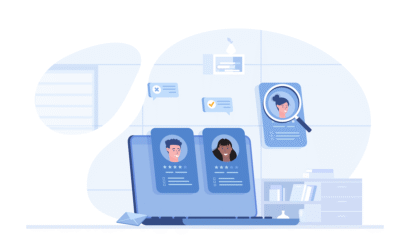In a world where the customer is in control, happy customers are the secret to growth.
The probability of selling to an existing, happy customer is up to 14 times higher than the probability of selling to a new customer, according to Marketing Metrics. Additionally, satisfied customers can be a valuable source of referrals to the sales team.
That’s why your customer service team has a direct impact on the effectiveness of your sales team. Forward-thinking sales organizations align their sales and customer service teams to improve customer experience, and to increase cross-selling and upselling opportunities.
Here are 8 customer service skills that lead to a customer-centric culture and increased sales.
1. Respond Quickly
Customers are busy and need a solution quickly.
A fast response from customer service is critical, whether on social media, email, live chat, phone, or other service platform.
Your customer service reps should have a definitive process for responding to each channel, as well as guidelines to handle common situations. This helps ensure a smooth customer experience and swift resolution.
2. Choose Enthusiasm
Customers are human, and humans appreciate a smile, empathy, and enthusiasm.
Teach your customer support representatives to start all customer interactions with a positive attitude. This is especially important for reps responding to complaints, who may receive the brunt of customer anger.
It’s critical that these reps have the right mindset and the service skills training to stay empathetic and positive in the face of frustration.
3. Listen
Sometimes, all a customer needs is to know that they’ve been heard. Other times, their issue may require action.
In either case, customer service representatives who listen carefully to the issue will be in a better position to assist. Teach reps not to jump straight to problem-solving mode, but to take the time to fully understand the customer’s concern and to let them know they’re listening.
4. Ask Good Questions
Good listening includes good questioning. Good customer service in sales teaches customer service reps to ask probing questions to get to the core of the issue, and to uncover unmet needs that may represent sales opportunities.
This consultative approach strengthens customer relationships and the answers to these questions can be used to identify and package an appropriate solution.
5. Adapt the Communication Style
Everyone has a preferred communication style.
Customer service reps can learn to quickly identify the style preferred by each customer–and adapt their approach to match.
When customers receive information in the format and style they prefer, it’s easier for them to understand and respond to it, and they feel happier and more trusting.
Start turning happy customers into your most profitable accounts now with IMPACT for Customer Service Training. Watch the video below to learn more.
6. Develop a Problem-Solving Attitude
Both sales professionals and customer service reps perform best when they maintain a problem-solving attitude.
Sometimes, customer service teams can get caught up in trying to placate the customer or avoid taking blame, when what the customer really needs is to have their problem solved.
A positive, proactive problem-solving attitude can also help the customer service rep to identify opportunities to offer the customer additional products and services.
7. Clarify and Confirm
Once the customer has been understood and a solution has been agreed to, make sure reps know to clarify the solution and confirm it with the customer. This creates clarity in the mind of the customer and reduces the risk of miscommunication.
If the solution includes a conversation with other employees in the company, such as referral to a sales team member, make sure the customer understands how that referral will take place. And then ensure that it is followed up on.
8. Say Thank You
It’s hard to overestimate the psychological value of a simple “thank you.” Customers like to know that their business is appreciated.
Teach reps to say “thank you” at the end of every customer interaction, and to follow up with expressions of gratitude via email and in other formats when appropriate. It can also be useful to build customer gratitude programs that include perks such as coupons, referral bonuses, and other benefits.
Customer Service in Sales Conclusion
Happy customers will stay with you longer, turn into repeat business, and refer their friends and colleagues.
That’s why it’s critical that you build a customer-centric culture in your organization. The question to ask yourself is, “Are our customer service reps simply meeting expectations, or are they aligning with our sales team to uncover and tap into new revenue opportunities?”
IMPACT for Customer Service is a training program that teaches your team how to serve and delight customers—and translates their efforts into additional revenue for your organization.
Whether you’re looking to train a dedicated customer service team, or would like to improve the effectiveness of any of your client-facing team members, this program can take your organization’s customer service from average to remarkable.
Learn more about the program and request an info packet here.




